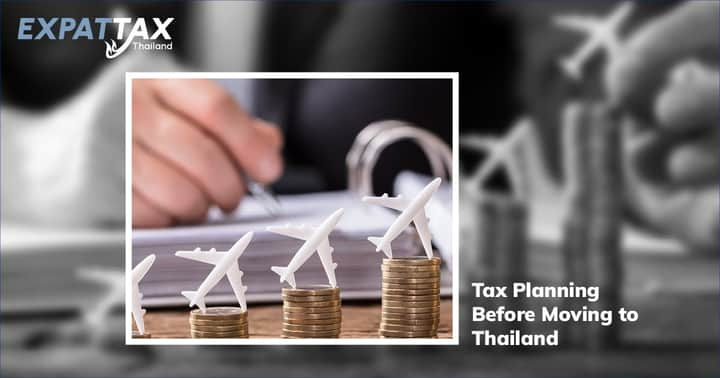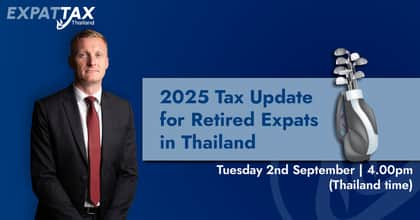Thailand, known for its beautiful landscapes, rich culture, and welcoming atmosphere, is a top destination for expats seeking a new home. Whether it’s the bustling streets of Bangkok, the tranquil vibe of Chiang Mai, or the stunning beaches, Thailand offers a diverse lifestyle that attracts people globally. However, while moving to Thailand is an exciting prospect, potential expats must research and engage in essential tax planning before they move.
Tax planning before moving to Thailand is not just about meeting legal requirements; it is a strategic action that significantly impacts your financial health. Understanding and navigating the intricate expat tax environment enables you to optimise financial outcomes and maintain compliance. It also ensures that you avoid being presented with an unexpected tax liability in either Thailand or your home country.
In this article, we guide you through the essential steps of tax planning before moving to Thailand, from understanding the impact of your nationality on your tax obligations to managing your income and investments efficiently. Whether you’re retiring, working, or investing in Thailand, a well-thought-out tax plan is your key to a stress-free and financially sound expatriate life.
Importance of Tax Planning Prior to Moving to Thailand
Due Diligence
Moving to a foreign country is a significant step for most people, and it requires thorough investigation and analysis to make any move successful. There are many different factors to consider, including where to live, cultural expectations, visa regulations, and how you will financially support yourself. As part of your financial due diligence, you should clearly understand the tax implications of relocation and make decisions that comply with Thai and international tax laws.
Financial Benefits of Pre-Move Tax Planning
Early tax planning offers substantial financial benefits. It enables you to minimise your tax liabilities by understanding Thailand’s assessable income rules and structuring your finances accordingly. Actions taken before becoming a Thai tax resident could significantly reduce or potentially eliminate your future Thai tax burden.
Taking Advantage of Tax Treaties
Thailand’s Double Tax Agreements (DTAs) are vital to your pre-move tax planning. They often offer reduced tax rates or exemptions on certain types of income. For expats moving to Thailand, these treaties can significantly reduce taxes and simplify issues related to dual tax liabilities. Investigating these treaties before relocating to Thailand can reveal specific provisions that may benefit your future tax situation.
Consequences of Inadequate Advance Tax Planning
On the flip side, inadequate tax planning before you move can lead to severe consequences, including unexpected tax liabilities and potential legal issues. Without a solid understanding of the Thai tax system, expats may face significant tax bills and risk penalties for non-compliance.
Equally, consideration should be given to tax rules in the jurisdiction where your assets are located because you don’t want to take actions that will reduce your Thai tax bill only to find that you have inadvertently created a tax liability in your previous jurisdiction.
International tax is a complex area requiring thorough consideration of all aspects in advance to ensure you can move to Thailand with confidence and the peace of mind that you are compliant and optimised for the best possible financial outcome. Whether retiring, working, or investing in Thailand, it is strongly advised that you seek professional tax advice and begin your tax planning well in advance to ensure a smooth and stress-free expat experience.
Double Tax Treaties for Expats Moving to Thailand
Expats moving to Thailand may face varying tax obligations based on their nationality, influenced by Double Taxation Agreements (DTAs) between Thailand and other countries. Thailand has established 61 different DTAs, each with its unique provisions. Understanding the agreements relevant to your situation is crucial for effective tax planning. This ensures you do not overpay on taxes and helps avoid legal issues related to non-compliance.
Understanding Double Taxation Agreements (DTAs)
Double Taxation Agreements (DTAs) are treaties between two countries designed to prevent the same income from being taxed in both places. This is particularly important for expatriates who may continue to receive income from their home country, such as pensions, rental income, or dividends. These agreements delineate which country has the taxing rights over various types of income, significantly impacting your tax planning.
For instance, under the Thailand-USA DTA, US Social Security payments are not taxed in Thailand. However, the Thailand-UK DTA does not exempt UK State Pensions from Thai tax. Understanding the specific DTAs applicable to your circumstances is crucial for efficient tax planning.
Practical Tips and Resources for Navigating Thailand’s DTAs
- Review the Specific DTA: Before moving, review the specific Double Taxation Agreement (DTA) between Thailand and your home country. This review should focus on the types of income that will be relevant to your situation. The full text of all Thailand’s DTAs can be found on our website here.
- Watch Our Videos: We have produced several videos explaining how Thailand’s DTAs work, including detailed examinations of particular agreements, and we plan to produce more in the future. We recommend staying informed by watching videos relevant to your circumstances. You can watch our videos here.
- Stay Informed on Changes: Tax laws and treaties can change. Stay informed about any updates to the DTA that might affect your tax situation, either through official government publications or your tax advisor. Sign up for the latest Thailand tax alerts here.
- Consult with Tax Professionals: This is a complex area. It’s prudent to consult with tax professionals who are familiar with both Thai tax law and the tax laws of your home country. Booking a consultation with Expat Tax Thailand can clarify your situation and provide actionable advice before you move to Thailand. You can book a pre-move tax consultation here.
Understanding DTAs is essential for most expats. By leveraging the benefits of DTAs and carefully planning for any income not covered by these agreements, you can ensure a financially efficient transition to your new life in Thailand.
Understanding the Thai Tax System
Navigating the tax environment in Thailand is a critical step for expats aiming to manage their finances efficiently and legally. In this section, we will cover the basics and link to other articles that address various issues in detail.
Tax Residency and Its Implications in Thailand
In Thailand, tax residency is determined based on physical presence in the country. If you are present in Thailand for 180 days or more in any calendar year, you are considered a tax resident. You may want to consider the qualifying criteria before moving because you have no tax liability on overseas income if you spend less than 180 days in Thailand. You can also avoid qualification by timing your move to Thailand. For example, if you move to Thailand in August, you will not have to pay taxes that year, enabling you to transfer assets and funds into the country without a tax liability.
Overseas Income Taxed on Remittance
A crucial aspect of the Thai tax system that expatriates relocating to Thailand must understand is that taxation of foreign-sourced income operates on a remittance-only basis. This means that as an expatriate, you are only taxed on the income you physically bring into Thailand. Income remaining outside Thailand is not subject to Thai taxes.
This flexibility offers significant advantages for tax planning concerning your global assets.
Remittance-Based Taxation Strategic Planning
The remittance-based system allows expats considerable control over their tax liabilities. Strategic management of the timing and amount of foreign income transferred into Thailand can effectively reduce your tax liability.
Before relocating to Thailand, it’s essential to consider how you might structure your assets to minimise future tax liabilities on remittances. Additionally, you might be able to reduce ongoing tax obligations for assets in your original location by moving them offshore.
However, navigating this area of international tax planning can be complex and risky. Expert advice is strongly recommended to avoid potential pitfalls and ensure compliance with all relevant tax laws.
Tax Planning for Retirement in Thailand
Many people choose to retire in Thailand, attracted by its appealing lifestyle, agreeable climate, and affordability. However, effective tax planning is essential to maximising retirement income and maintaining long-term financial peace of mind. Without proper consideration of the tax implications for pensions and other assets before relocating, retirees could face unexpected tax liabilities that significantly impact their retirement funds.
Taxation of Pensions in Thailand
While many countries offer tax incentives for pension schemes and retirement savings, retirees must understand that overseas pensions may be subject to tax if remitted to Thailand unless a Double Taxation Agreement (DTA) provides specific exemptions. Income from pension schemes such as Australian Superannuation, US Roth IRAs, UK SIPPs, and international schemes like QROPS and QNUPS are taxable in Thailand upon transfer.
Integrating tax planning into your relocation preparations is crucial for avoiding or minimising potential tax liabilities. Additionally, it’s important to consider the tax regulations in the jurisdiction where your assets are located. You need to ensure that actions taken to reduce your tax bill in Thailand do not inadvertently create a new tax liability on your pension in your home country.
Pension tax planning is a highly complex area, and we highly recommend getting professional advice before deciding on withdrawing or moving pension assets. This proactive approach will help safeguard your financial interests and ensure a smoother transition to retirement life in Thailand.
LTR Wealthy Pensioner Visa
If you have significant pension assets, consider applying for Thailand’s Long-Term Residency (LTR) Wealthy Pensioner Visa. This visa exempts holders from paying taxes by Royal Decree, offering an attractive option for retiring in Thailand. The qualifications for the LTR visa are demanding but meeting them eliminates tax concerns entirely. For more information about the LTR visa, read our in-depth article and watch our video.
Restructuring Investment Income Before Moving to Thailand
Many expatriates rely on accrued wealth and returns from overseas investments to meet their living costs. Section 40.4 of the Thai Revenue Code specifically covers income from overseas investments, including interest from bonds and bank deposits, dividends, and capital gains. If these are remitted to Thailand, they are all assessable for personal taxation, although the original capital accrued before becoming a Thai tax resident is exempt.
Investment planning before moving to Thailand could potentially reduce future tax liabilities. This requires carefully considering the balance between potential capital gains and likely future tax liabilities. There are many factors to consider, and consulting with tax professionals knowledgeable in both Thai and international tax systems is highly recommended.
LTR Wealthy Global Citizens Visa
Thailand offers a potential tax-free option for high-net-worth individuals and families through its Long-Term Residency (LTR) visa. This visa allows holders complete exemption from personal income tax in Thailand. The eligibility criteria are stringent, requiring a minimum of US$1 million in assets, an annual income of US$80,000, and a minimum investment of US$500,000 in Thai government bonds, foreign direct investment, or Thai property.
Moving to Thailand: Overseas Property Rental Income
Some expats in Thailand rely on rental income from properties abroad to support their living expenses. This income is taxable in Thailand if remitted into the country. If rental income forms a significant part of your income after moving to Thailand, you can claim tax credits for any taxes paid in the country where the property is located. It’s advisable to have a professional advisor assess this before you move, to make an informed decision on how this will impact your tax situation.
Tax Implications of Selling Property Before and After Moving to Thailand
In Thailand, capital gains earned by individuals from the sale of real estate are typically treated as ordinary income and taxed accordingly at the standard income tax rates. This has significant implications for expats who sell a home abroad or other overseas property (even if this is their main residence).
Selling property in your home country before relocating to Thailand can potentially simplify your financial affairs and reduce your tax burden. There is no tax due on property sales in Thailand before becoming a tax resident, allowing you to bring the sale proceeds into Thailand at any time in the future, without incurring a tax liability on the sale proceeds. However, it’s important to note that if you subsequently reinvest the proceeds, capital gains tax will be due on any investment gains.
Conversely, if you sell property after becoming a tax resident of Thailand, the situation changes significantly. As a tax resident, depending on the double taxation agreement in place, you could be liable to pay tax on the capital gain from the property sale. This creates a substantial tax liability on any funds from the sale remitted to Thailand and is not a recommended course of action.
Benefits of Selling Property Before Relocating
Selling property before you relocate to Thailand can offer several advantages:
- Financial Simplification: Selling your property before moving can simplify your financial situation, reducing the complexity of managing overseas assets from Thailand.
- Tax Efficiency: Managing the proceeds from the sale while still a non-resident of Thailand can provide greater flexibility in tax planning. This includes opportunities to invest or deposit the proceeds to optimise your tax position before taking up residence in Thailand.
- Capital Gains Tax Planning: Depending on your home country’s tax laws, you may benefit from specific tax reliefs or exemptions available for capital gains on property sales. These could be more advantageous if completed before changing your tax residency.
Important Advice on Selling a Home and Moving to Thailand
For many, their home is their most valuable asset, and selling it releases significant capital. If you are moving to Thailand and plan to sell your overseas home, it’s crucial to seriously consider the tax implications in the country the property is sold. We strongly advise seeking professional advice to navigate this process effectively.
Tax Advice Before Moving to Thailand
Navigating the complexities of international tax rules and understanding the nuances of Double Taxation Agreements (DTAs) is essential for anyone planning to move to Thailand. The intricacies of these agreements and the Thai tax system can significantly impact your financial landscape, especially when managing investments, retirement funds, and income from abroad. With meticulous pre-move tax planning, expatriates can avoid facing unexpected tax liabilities that could undermine the financial benefits of living in Thailand.
Effective structuring of your finances before relocating is paramount. By aligning your financial strategy with the requirements of both Thai and international tax laws, you can optimise your tax position, ensuring that your move is not only compliant but also financially advantageous. This includes making informed decisions about the timing of property sales, the remittance of income, and the strategic management of pensions and investments.
Given the potential risks and the high stakes involved, consulting with a tax professional early in the process of moving to Thailand is strongly recommended. A tax advisor with expertise in Thai and international tax regulations can provide invaluable guidance, helping you confidently navigate this complex area. They can assist in tailoring a tax planning strategy that maximises your financial benefits while ensuring full compliance with all relevant tax obligations.
We urge you to arrange a consultation as early as possible to secure your financial future as you embark on this exciting new chapter in Thailand. This proactive step will help you avoid common pitfalls and ensure your transition is as smooth and stress-free as possible. Whether you are retiring, working, or investing in Thailand, thorough tax planning is your key to a financially sound expatriate life.
For more information and to book a consultation, please visit our website or contact our team directly. Your partnership with experienced tax professionals will be your best resource as you plan your move to Thailand.



